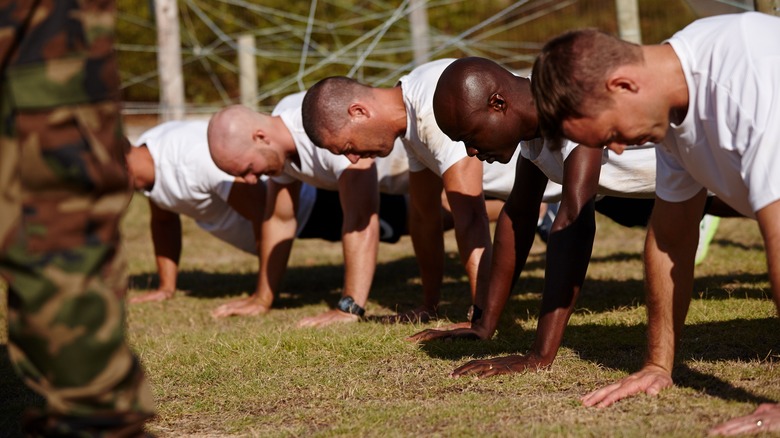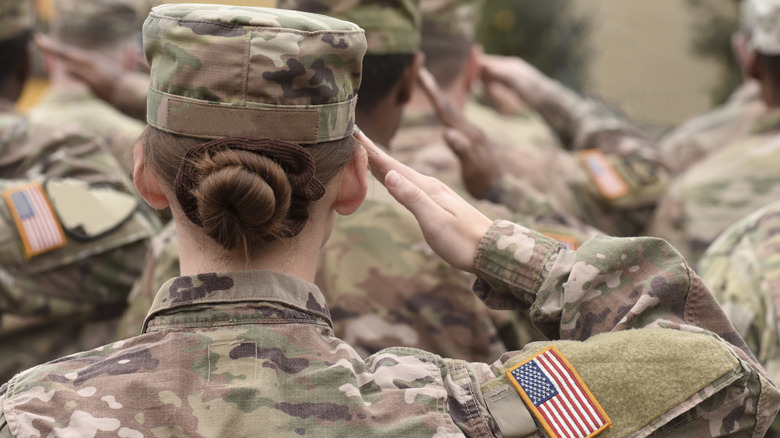What The US Military's Body Fat Rule Actually Means (And Why High Fitness Scores Matter)
A desire to be in our best shape can lead to a toxic fitness culture. If you're heavier in weight, you can be subject to fat shaming, but then if you are slender, others may call you names for being too skinny. As a result, society ends up grappling with unhealthy eating habits, paying lots of money for gym memberships, and worrying about the link between energy drinks and cancer. It all becomes overwhelming. This stress about body fat percentage doesn't just impact the general public, but also the United States military.
The military saw a correlation between higher body fat percentages in soldiers and lower Army Combat Fitness test scores. The Army Body Composition Program aims to keep soldiers at optimal fitness levels so they can handle the physical challenges they encounter in the military. It used to be that soldiers with too high a body fat percentage, based on a waist measurement test, would be enrolled in the program. They would then get personal fitness oversight and work with a dietician to lose the fat.
However, as of September 2025, that rule changed. The U.S. Army shifted from an emphasis on body fat to an emphasis on simply passing the physical fitness tests. This means that the military is no longer limiting the definition of being athletic to a soldier's body fat percentage. Though this is a positive move in the overall understanding of fitness, medical data still indicates that having too high or too low a body fat percentage carries its own risks.
The new military body fat rule
The U.S. military is always focused on making better soldiers, even through biohacking blood. The Army's new directive for a soldier's body fat says that if a soldier scores high enough (80 points) in all elements of the fitness test — consisting of deadlift, pushups, sprint-drag-carry, plank, and two-mile run – then the body fat program rules don't apply to them. They won't even have to get measured, rewarding a the soldier's actual athleticism.
Sergeant Major Christopher Stevens, senior enlisted advisor, US. Army Deputy Chief of Staff, G-1, released a statement published by the U.S. Army Public Affairs regarding this change that said, "This is a welcome continuation of our previous policy under the former Army Combat Fitness Test." He also said, "It rewards soldiers who consistently demonstrate high levels of fitness, which supports readiness, health, and creates a culture that values performance."
Soldiers must take the fitness test once every eight months if they are in the Regular Army or an Active Guard Reserve Soldier. That deadline is extended to once every year for the National Guard and Army Reserve Soldiers. However, if the soldier misses the deadline for the test, then they must undergo a body fat assessment.
Fitness focus over fat percentage focus
Body fat percentage is not an automatic determiner of fitness. Issues of inaccurate measurements and inconsistent measuring locations on the body play a major factor. The width of the waist can be affected by the body's bone structure and muscle composition in addition to fat. Height, sex, race, and overall genetic body build present wildly diverse factors into the mix. There is no one size fits all method to determine how a person's unique fat composition relates to their fitness in an otherwise healthy individual.
There is a medical correlation between being overweight or obese and health risks. These include type 2 diabetes, high blood pressure, heart disease, asthma, some cancers, and osteoarthritis. It is also correlated with mental health issues encompassing stress, self-esteem, and depression. However, these mental health issues have also been related to the way the public reacts to those who are overweight and obese. Though it can be tempting to turn to ChatGPT for healthcare therapy, experts emphasize that is never a good idea.
On the flip side, a low body fat percentage is also correlated with health risks. One is osteoporosis due to a loss of fat support around the bones. It's also associated with a weak immune system, low testosterone for men, and ovulation problems for women. Perhaps instead of focusing on how much, or how little, fat we have, the focus should instead be on our overall physical fitness and health as the military has demonstrated.


